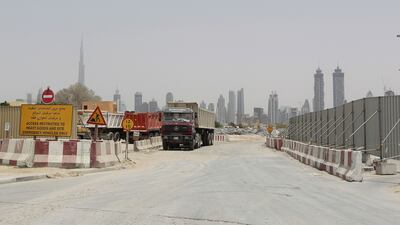Dubai’s current slate of major infrastructure projects will provide one of the UAE’s main sources of non-oil growth in the run-up to 2020.
But they could also be a domestic source of economic risk if not properly executed, according to the IMF.
The IMF has predicted that the UAE’s econonic growth will slow to 3.4 per cent this year, before rebounding to 4.6 per cent by 2020, supported by “the implementation of megaprojects and private investment in the run-up to Expo 2020”.
If not prudently implemented, the biggest projects might “create additional macro-financial risks for Dubai’s GREs [government-related entitites], banks and ultimately the government in light of the debt overhang from the 2008-09 global financial crisis”, the fund said.
Indeed, despite successfully renegotiating a US$20 billion refinancing of Dubai World this year, the emirate’s government and GRE debt “continues to be substantial at around $143bn”.
“Government investments should be preserved relative to non-hydrocarbon GDP to support infrastructure, while the implementation of GRE megaprojects should be gradual, in line with the expected demand,” said the IMF.
The Dubai government’s budget for this year is Dh41bn, and 13 per cent of this, or about Dh5.3bn, has been allocated for infrastructure work.
Given that current spending plans for infrastructure investment include $7.8bn to upgrade Dubai International Airport by 2018, and that the first phase of a $32bn expansion of Dubai World Central is expected to be concluded by 2022, it seems likely that money may need to be raised.
And given GREs’ ambitious projects – such as Dubai Holding’s $6.8bn Mall of the World and the newly-announced Meydan One (due to be connected to the Metro’s Gold and Purple Lines) – it is believed that several external sources of finance will be required.
Sara Carmody, a legal director at the law firm Addleshaw Goddard, said debt financing was usual for large infrastructure projects in the region. Local banks such as Emirates NBD, NBAD and First Gulf are active lenders.
“There is a fair amount of liquidity in the market at the moment,” said Ms Carmody.
Dubai also has the option of selling further bonds or sukuk, but for a major project such as Al Maktoum International Airport, there may not be enough appetite for substantial amounts of new debt. That is in view of the $143bn of debt raised by GREs and government-related companies over the past years. The prospect of the government ceding equity in an asset as important to the local economy as an airport also seems to be unlikely.
Dubai could make greater use of contractor financing, in which a project’s builders fund elements of its construction and are paid over stages after its completion when the project begins to generate income, said Thomas Wilson, the head of Middle East construction and arbitration practices at the law firm Squire Paton Boggs.
The Roads and Transport Authority is understood to have agreed a deal involving contractor financing for part of the Dubai Canal project.
The Dubai World Trade Centre District is the first project where funding from UK Export Finance was used – a £3bn (Dh17.2bn) facility that the British government set up to help UK businesses secure contracts overseas.
UK Export Finance has also reportedly offered up to $2bn to help fund the expansion of Al Maktoum International Airport, subject to the involvement of its consultants and contractors. Export credit agencies and export/import banks from other countries – including Japan and Korea – have also helped to fund projects involving contractors from their countries.
“It can give the contractor who is able to bring funding to the project an edge,” Mr Wilson said. “I’ve heard that Chinese contractors are talking about investing in projects and bringing in contractor financing to support projects.”
Ms Carmody said projects using such mechanisms “will have to find a clear structure at the outset in terms of how the funds are being drawn and how the money will be repaid, because all of the funding will eventually have to be repaid”.
William Jackson, a senior emerging markets economist at Capital Economics, said as long as proper consideration was given to commercial viability, borrowing by governments and GREs need not be problematic.
“Overall, borrowing to invest itself is not a bad thing. The concern is that when investments are made into projects that will not deliver the expected returns, meaning borrowers may struggle to repay the debts. This was very much the problem with the pre-2008 GRE borrowing boom,” he said.
Capital Economics has voiced concern that some of the projects GREs announced in the run-up to Expo 2020 run the risk of falling into that trap, particularly if the spike in visitor numbers that Dubai expects to deliver for Expo 2020 is not sustained after the event.
“If Dubai is to really achieve the targets for visitors in 2020, it could subsequently be left with an over-supply of hotel rooms, office space and transport infrastructure,” said Mr Jackson.
mfahy@thenational.ae
Follow The National's Business section on Twitter


